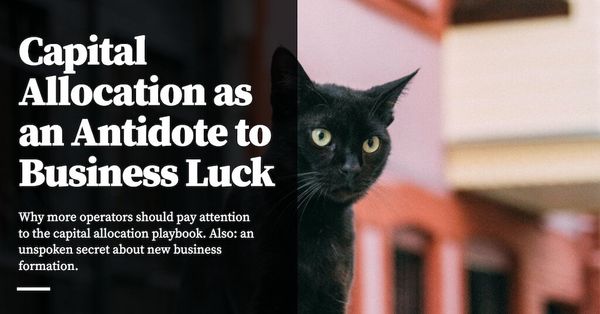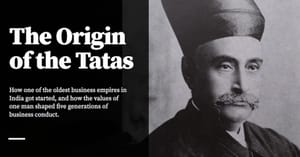This is Part 7 in a series on the expertise of capital in business. You may read the previous part here.
Last week’s essay was about capital allocation. It was not shared as widely as I had hoped. This isn’t too surprising: Buffett has been talking about capital allocation for at least four decades now; long-term investors have known about the importance of capital allocation for about as long. But capital allocation as a topic has never been particularly attractive to business operators. This is partly, I think, because it’s such a foreign concept (“You mean I have to think like an investor? Gimme a break — I have to deal with goddamned competitors and I’m looking for a moat to keep them at bay and yesterday my head of sales told me she was quitting. I’m dealing with stupid business-related fires every day.”) But perhaps it is also unpopular because it is so unsexy. Good capital allocation can only be celebrated after a period of decades — it is never amazing in the moment. In this manner good capital allocation is a little like good parenting.
As an operator, I agree with both sentiments. I once described business as an ‘octopus game’; in Prioritise the Highest Order Bit I told the story of a particularly trying time at an old company, right after we had executed our first layoffs. If you are an early-to-mid stage operator, there are often too many things you’ll need to do to keep your business afloat to worry about, uh, investment decisions. And this is also true if you are an employee, so busy making sure that the wheels of the business are turning day-to-day. In this view of the world, capital allocation seems like an abstract, academic concept.
So I’ll tell you why I’m interested in the topic. I think capital allocation is a way to ameliorate the effects of luck in business.
The Problem of Business Luck
How do you build a massive business from scratch? The glib answer is that you need to get lucky.
- For starters, you’ll need to find a business opportunity that is radically, wondrously huge, and able to grow to billions of billions of dollars. As we’ve already examined earlier in this series, such business opportunities are very rare.
- To make things worse, you need money to make money — which means that you need to capitalise this business somehow. If you are very lucky, it turns out that your multi-billion dollar business opportunity funds itself (you are Microsoft, as I jokingly said in The Skill of Capital). But more often than not you raise funding from venture capitalists or other capital providers, who are optimised for exactly this kind of growth.
- You must also be lucky to ride out the entire journey from startup to scale-up, holding on to control over the company. You must be lucky in that you actually turn out to like the business enough to run it for the long term, you are lucky because you turn out to actually be good at it, and you are lucky to not get kicked out by your investors.
- Also you must be lucky that the business opportunity is not illusory. The vast majority of startup stories is that the market shows promise but it turns out you’ve started a company in the wrong corner of this newly formed industry; a few years into your journey it becomes clear that all the profits are to be captured by some other company positioned in an entirely different corner of the market. (That company’s founders got lucky and you did not.) Or perhaps the business turns out to not be a billion dollar opportunity in the first place — just a solid 200 million, say, in equity value. If you’ve raised venture capital, then this terminal valuation is far below the VC investment hurdle rate. Oh, they’re writing you off? They’re pushing you to get acquired by another portfolio company because they want to close off the investment? So sad, you got unlucky.
There are lots of articles about how to start a startup or how to get ideas for your startup, or how to raise venture capital for the idea that you stumbled into for your startup. What they all neglect to mention is that you have to get lucky. A business idea is akin to a dice roll on a 100-sided die. One chance in a hundred you hit the jackpot. 10 times out of a hundred you get a sizeable exit, enough to make you retire for good. 50 times out of a hundred you end up with a workable small-to-medium sized business that is profitable, if run as an actual SME (and not loaded with venture capital, poised for growth where none exists). The remaining 39 dice rolls you end up with bad businesses, or with nothing.
The numbers I gave you are all stylised, but the overall point is, I think, clear. The highest order bit in new company formation is luck. You can lie to yourself and say that you will almost certainly ‘get lucky’ in the first few rolls of the die. (You might even have that come true!) You may dismiss this by saying that this is ‘true but not useful.’ But it’s really difficult to read about the expertise of entrepreneurship or to read case studies of new company formation and not conclude that luck is the dominating factor to new venture creation. Every single business biography is, in some ways, a story about luck.
With that said, I take accusations of ‘this is true but not useful’ very seriously. My entrepreneurial friends say that they cannot afford to think about luck. They have a point. When you’re talking about aggregate truth, it is correct to say that ‘new venture creation is a story of luck.’ But how is that useful to the individual founder? Either you’re lucky or you’re not. So let’s fix that by making this observation more useful.
Let’s say that you’re a startup founder. Let’s say that you raised a small seed round and built a B2B SaaS (software as a service, selling to other enterprises) and it turns out — five years into it — that your startup will never hit venture scale. It will at most be worth $50 million in valuation; your top-line hits a ceiling of $8M annual recurring revenue (ARR). You think you might be able to get it to $10M ARR, but it’s been two years of stagnant growth now, so you’re not sure.
This is a common outcome in startupland. You’ve rolled your dice and failed to hit the jackpot. The common outcome is to sell the business, pocket whatever money you make (which may or may not be a life changing amount, to be fair), and then reroll your dice. This presumes that you may not keep the results of your current roll and roll a new, second die. It presumes you cannot buy the results of other people's rolls. And it presumes that you cannot add the results of new rolls to your current roll.
It has always puzzled me that so many people are aware of Buffett’s story but do not then reason about the implications of his actions. Buffett bought Berkshire when it was a failing textile business in a dying industry. It had worse than no moat: its death was guaranteed.
Buffett installed a new manager, Ken Chace, atop Berkshire, educated him on ‘return on invested capital’, and told him to harvest (and, if possible, optimise) the cash flows even as the business was in its death throes. Buffett would then use that sputtering source of cash to reinvest into other companies. Under no circumstances was Chace allowed to plough money back into Berkshire’s textile operations — that would just be throwing good money after bad. In 1967, Buffett offered Berkshire shareholders a swap: anyone who wanted an income-producing security could have a 7.5% debenture in exchange for Berkshire stock. A total of 32,000 shares were turned in. In one fell swoop Buffett washed out of his shareholders those who wanted short term income, ensuring that the rest were more likely to care about long term ownership (and underlying growth) than in dividends. He also consolidated his control of Berkshire with this manoeuvre. And then Buffett slowly rebuilt Berkshire into a conglomerate of multiple, higher-quality cash generating businesses, at each step harvesting the cash flow to buy yet more businesses.
To return to our dice roll analogy, Buffett took a bad roll of the die and parlayed it into buying the results of other people’s dice. He repeated this until he ended up with a pretty large business. You can sort of see how this might apply to our theoretical startup founder. Let’s say that you are again, in our startup founder’s shoes. You rolled your die and built a max $8M a year business. By venture standards, this is an unimpressive outcome. Your institutional investors will not care what you do with your business at this size; the angel investors are happy if they receive a smaller return on their capital, but are otherwise not particularly interested. But your business is in a better place than Berkshire was when Buffett took it over. SaaS revenues are sticky. You have no textile union to placate (Buffett did; he had to run some of his factories at a loss for years to maintain the peace in New Bedford). Sure, you have several unaligned shareholders. But what if you … bought them out, washed out those who were not aligned, and then took your time, harvesting cash, slowly allocating to other businesses? What if you played the capital allocation game? Would this not be a path to a large outcome, albeit with less raw luck, taking more time?
Other Examples
What is the general form of the capital allocation playbook? The general form is this: you gain control of one cash flowing entity. Perhaps this is by luck: you start a business that happens to work, and it turns out to have certain cash flow characteristics. Or perhaps it is by intention: you buy a business that throws off cash. You run that entity well, optimising for free cash flow. And then you invest the outputs of that cash flow into other, higher quality options.
Don’t get me wrong: I’m not saying that this is easy. Like anything else in business, there’s an element of eating glass each day. Certainly there’s an element of skill involved. But skill is the point. One of the things that has always bothered me about new business formation is how much of a crapshoot the initial dice roll is, and how irrecoverable a dice roll may be if you’re playing the venture game. It often doesn’t matter how skilful you are as an operator, the dominating factor for founders is often luck.
With the capital allocation game, though, how much you want to be exposed to luck is up to you. In Buffett’s, Mark Leonard’s or Henry Singleton’s models, you only buy the results of other people’s dice rolls — that is: mature, high quality, cash generative companies. In the case of an Amazon, Jeff Bezos chose to roll additional dice internally — creating new businesses from scratch like the Kindle, or AWS, to good effect. It’s no accident that free cash flow generation throughout Amazon is designed to support invention, which explains the title of Jeff Bezos’s book.
None of this is new. Here’s magazine entrepreneur Felix Dennis, in his unfortunately-titled quasi-self-help, quasi-autobiographical How To Get Rich:
Make More Baskets: Diversify!
Eggs being what they are and the world being what it is, they will sometimes break. No matter how good your idea, how fierce your resolve and how lucky you are in the early days, you must prepare for that eventuality. It will come. It always comes.
I am one of the richest self-made men in Britain for two reasons. I own my company outright, and I began to make more baskets the minute the first had a few eggs in it. Let’s get down to how and why.
Forget the magazine business. Take any business and any idea. You need focused, tunnel vision to get it on the road and to begin making some money. You can expand it, maybe franchise it or take it to other cities or even other countries. But, in reality, it is still the same basket with a lot more eggs in it.
If you had created a chain of fast-food stores, then it would be unwise to leave matters there. Public tastes change and customers are fickle. To protect your investment, you would need to create new baskets. You would need to consider, perhaps, the creation of or the acquisition of a soft-drink operation. Or of a branded coffee. And you don’t have to be such a massively successful chain to do it. Because, sometimes, the new basket will be worth more than the old.
(…) Strangling your own baby, in order to grow, is far more common than you might think. If you have a successful monthly magazine, for instance, and then launch a weekly in the same category, you will inevitably weaken sales of your original title. This will follow as surely as night follows day. So should you launch the weekly magazine?
Yes! A thousand times yes! Why? Because if you do not launch the weekly edition, even though you know it is a good idea, then your rivals will do it for you. You will then be left with a damaged monthly and no weekly.
Or take the Mars family as an example (yes, the same Mars of Mars bars and M&Ms — this excerpt comes from the marvellous The Emperors of Chocolate):
In 1934, not long after the Mars bar proved a success, Forrest [Mars] purchased a small British company called Chappel Bros., which was canning meat by-products for dogs. Throughout Europe, dogs and cats were eating table scraps. No one had even considered an alternative. But Forrest saw possibilities. He believed that he could convince pet owners that Chappie’s canned food was more nutritious, and it wasn’t long before Britain and the rest of Europe bought the idea. With no competition, Petfoods Ltd. soon dominated the market. Within five years, Forrest had increased sales fivefold, to £100,000. Chappie became the cornerstone of Mars, Inc.’s pet food empire, which today accounts for nearly half of the company’s total sales.
Or the following passage, on the ‘evil’ Koch Industries, from Christopher Leonard’s Kochland. The book documents the arc of Charles Koch’s capital allocation after inheriting a disparate set of oil production assets, initially in service of surviving the oil cycle, but later in service of empire building:
In 2018, as he listened to the division heads make their presentations, Charles Koch oversaw a corporation that seemed to vindicate his every belief. Entire, massive, profitable units of the company did not even exist in 2000, when Charles Koch launched a turnaround effort after the disasters of the 1990s. Georgia-Pacific, for example, was generating over $1 billion in annual profits, on average. The Koch Fertilizer division, the result of one risky bet in 2003, was delivering billions in revenue each year. Then there was Molex, the microchip company, and Guardian Industries. Charles Koch could make the case that his company wasn’t just perpetually growing, but perpetually transforming as well, entering new industries, abandoning the old, always searching for the next opportunity. And bolstering these experimental efforts were the reliable cash cows. The Pine Bend refinery, still refining cheap crude and selling expensive gasoline, throwing off cash around the clock. And now Corpus Christi, repeating the same trick thanks to the fracking revolution. And the trading division, still selling derivatives, still trading in markets where it had an unparalleled view into real-time shipments and inventories.
(…) If the economic future was uncertain, Charles Koch seemed supremely calm during the winter and spring months of 2018. This might have been due to that fact that even in the worst-case economic scenarios, there was seemingly no plausible scenario in which Koch Industries actually failed. There might be layoffs. The company might have to sell some divisions at fire-sale prices. But the Koch Industries entity itself, the core business that executives referred to as KII, seemed impervious to failure. There was simply too much cash in the company, and too little debt, to envision it going under. Koch’s bread-and-butter assets—the oil refineries, the fertilizer plants, the paper mills, the commodities trading desks—were part of the machinery that provided life’s necessities. People would buy gasoline and fertilizer during any recession, and it was unlikely that big companies could swoop in and build multibillion-dollar facilities to steal Koch’s share of the business. Koch’s business was also protected by the masterfully constructed corporate veil, the massive, multichambered legal nautilus shell that walled off various parts of the company from one another. Divisions could fail and be sued, but the damage would never penetrate to the heart of KII.
Many years ago, when I was still doing outsourced app development, I took a sales meeting at UBS. They wanted our help to build some app for their wealth management division or something — I can’t remember exactly. I was fresh out of university, dressed in an uncomfortable black suit, and I looked very out of place at UBS’s offices. “Do you know what we do?” said the project manager who met me. Of course not, I replied.
“We’re a private bank.” he said, “Wealthy families leave their money with us. We manage it for them.” He waved his hands at the window, where we had a great view of Singapore’s financial centre. Somewhere nestled amongst the high rise buildings was a hawker centre. “A number of our local clients,” he continued, “have the bulk of their wealth in one business. It's common to have most of their net worth in a chicken rice store, say.”
A few days later I was relaying this conversation to a friend, tickled by the idea that the family behind a chicken rice chain would bank at UBS. “It’s a pity,” he said. “Singapore went from third world to first in a single generation. Plenty of fortunes in that rise. If the family had instead gone into real estate, they’d probably be much richer than they are now.”
It took me many years before I realised that my friend’s pronouncement was mistaken. It’s trivially easy to say “Oh, if only you didn’t start a chicken rice business. You’ll be much more successful.” You could have just as well said “oh, if only you hadn’t started Basecamp, but started Atlassian” — or “if only you’d started Facebook, instead of one of the gajillion social network startups that died.” You don’t get to choose what kinds of businesses work for you. Sometimes you start a company and it turns out you can be the market leader and it makes you a fortune several times over. Other times you start a company and it’s merely an ok outcome. There is a path dependence to business formation — you start what you start, when you start based on who you know, where you are, and what you know. It’s thus a little ridiculous to say “oh, you should’ve quit and rerolled the dice.” People who start chicken rice businesses don’t necessarily start real estate development companies. Maybe it works. But what if it doesn’t?
Having the family put their wealth in UBS (or opening a family office, or diversifying out of chicken rice) would be the more reasonable move. It is less luck dependent. And who knows — if for some godforsaken reason a world class capital allocator comes into ownership of a chicken rice chain and decides to turn it into his or her holding company, it’s not too much to imagine a diversified conglomerate by the name of Boon Tong Kee in 60 years or something. Stranger things have happened. Like, I don’t know, a failed textile company owning a whole bunch of insurance businesses, and then running a festival for its shareholders once every year in a random town in Nebraska.
Wrapping Up
Should you believe my argument here? Absolutely not. I make a big deal on Commoncog about believability, and about how you must gauge all advice on a hierarchy of practical evidence. I am not believable on this topic. Sure, I helped my old boss build a bootstrapped business, and five years after I left he hit his ‘number’ and may effectively retire. But we got lucky with that company, and he did not play the capital allocation game despite knowing full well that he could. So the playbook is untested, at least in my personal experience.
This in turn means that the argument that I have presented to you here is at the lowest level of my hierarchy of practical evidence: it is merely a plausible argument. Caveat emptor.
But it’s worth it to take a step back and ask why it is unlikely that anyone would ever make this argument. I believe that it is viable, though I’m just some dude on the Internet talking his book. I don’t yet know if I can make it work. Am I likely to talk about this topic after I’ve succeeded? No. I would be too busy doing other things. And if not articulated by people who have done this, who else would take an entrepreneurial lens and apply it to the topic of capital allocation? VCs? Angel investors? It is unlikely: their incentives do not align with such a model.
In truth, nothing I say here is new. Everything that I’ve described in this piece is at least a hundred years old, and put to practice in a whole bunch of businesses in a whole bunch of industries all around the world. The only reasons that people don’t talk about this model are two fold: first, that it requires some capital expertise to articulate, much less to understand. It’s not an accident that this essay comes pretty late in the Capital Expertise series.
And second, to be brutally honest, there is nobody who will get rich from making this argument. It is in the venture industry’s interests that you believe that the only way to a billion dollar outcome is to swing for the fences. It is in their interests to have founders believe that anything less than a venture scale outcome is failure; that they must reset, reroll their dice, and try again for glory. Heck, it is arguably good for society that many entrepreneurs believe this, and that many startups are created as a result of that belief. (Lest you misunderstand, I happen to think that VC is a net good for the world). Consequently, there are many articles about the venture route.
But what if you decide to go down the capital allocator’s path? Well: the compounding takes a long time, the decisions are decidedly unsexy, and there is only so much surplus that gets created as a result of your businesses. If you decide to bring some long-term shareholders along with you, that would be wonderful for all involved. But you may also — like the Koch brothers, or the Mars family before them — opt to go it alone.
At any rate, it is unlikely to have essays written about much of this: the only person who gets rich from this playbook is you.
This is Part 7 in a series on the expertise of capital in business. You may read Part 8 here: High Roller: Lessons from America’s Richest Banker.
Originally published , last updated .
This article is part of the Capital topic cluster, which belongs to the Business Expertise Triad. Read more from this topic here→





